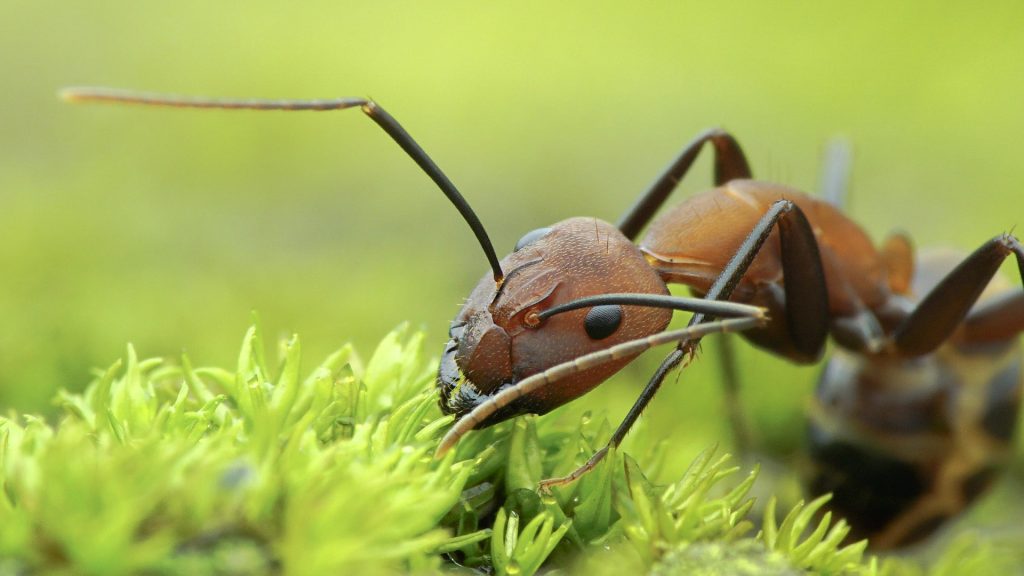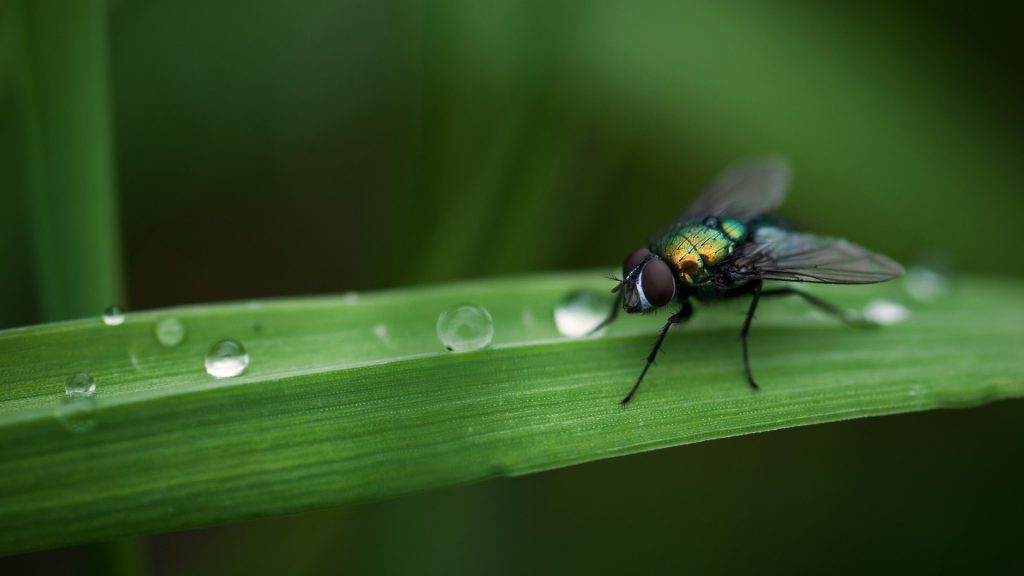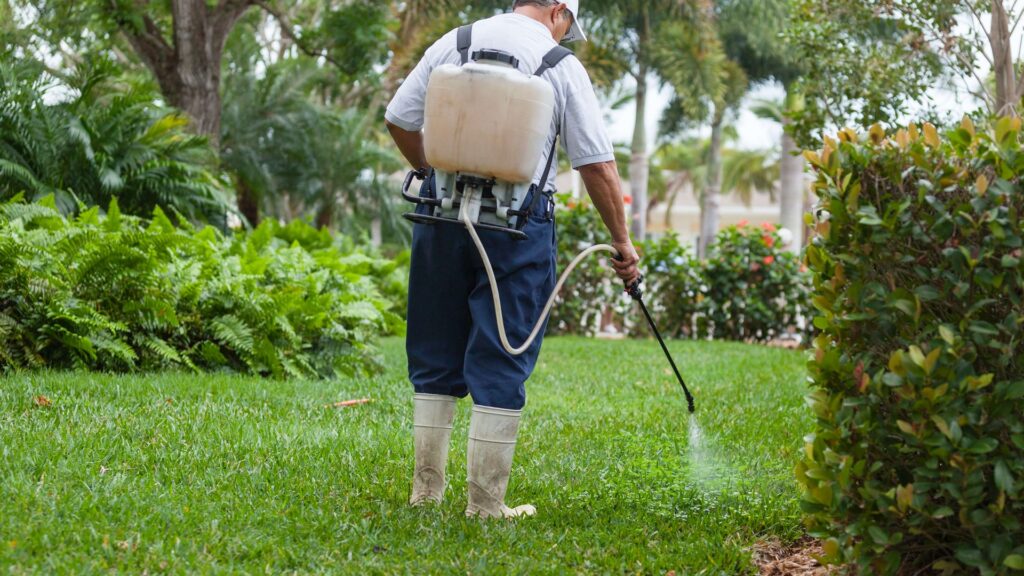
Organic Lawn Pest Control That Really Works
Does organic pest control really work?
That’s a question we get a lot, and it’s not surprising considering concerns surrounding highly toxic commercial pesticides.
Here’s a straightforward answer:
Does organic lawn pest control actually work?
Yes, organic pest control works! And you can get a beautiful, green lawn without the use of chemicals!
This guide will show you everything you need to know about organic lawn pest control and some of the best natural and highly effective pesticides.
Before we get into all the nitty-gritty details, here’s a quick lowdown of what organic lawn pest control is and how it compares to synthetic products.
What is Organic Lawn Pest Control?
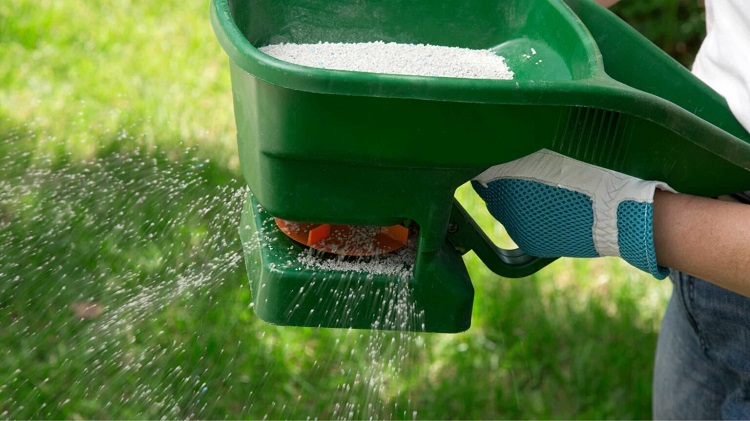
Controlling insect damages on lawns using natural, biological, or biorational methods is known as organic lawn pest control.
The methods involve using “living” or non-manmade materials to prevent, limit or kill damaging turf pests.
This natural approach affects insects and other pests in one or more of the following ways:
- Repel pests from feeding on your lawn
- Disrupt the molting phase of insects so they don’t mature
- Outright kill pests
Organic Vs. Synthetic Pesticides for Lawn

No doubt, synthetic or non-organic pesticides work great for lawns. But there’s a catch!
They poison the soil, destroy plant life, and are generally not good for the environment.
And that’s not all. They are highly toxic to humans, too!
Potassium, phosphorous, and nitrogen are some of the commonly used compounds in synthetic pesticides.
If these were to leak into freshwater through the soil, we’ll have major water pollution to deal with.
Considering the unpleasant side effects of non-organic pesticides, it only makes sense that more people make the switch to an organic approach.
Organic lawn care is safer for humans, pets, water, and the environment at large. Plus, it makes the soil healthier and better supports grass growth.
The Need for Extra Caution with All Pesticides
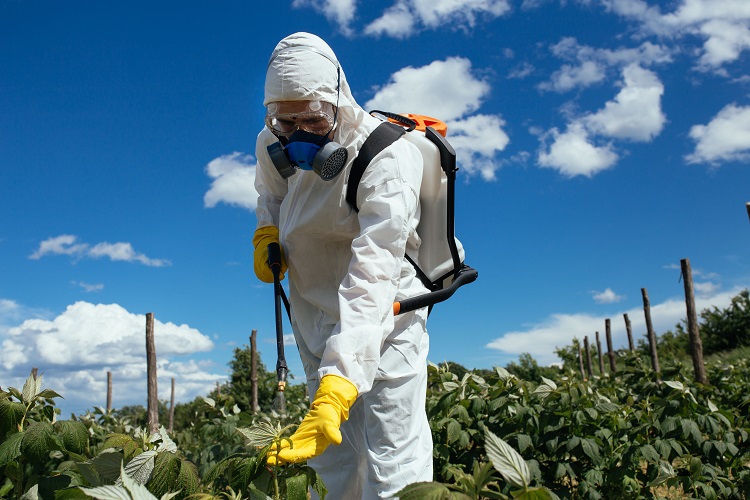
Here’s the thing, though.
Even if you opt to control pest damages on your lawn using natural methods, you still need to use these non-manmade solutions with caution.
Agreed, they are mostly safe – no doubt about that. But the “-cide” suffix in “pesticide” literally translates to “killer!” And that’s definitely something you don’t want to take lightly.
Most people are aware of the potential hazards of synthetic pesticides. But when it comes to natural or biorational methods, the general assumption is that there are zero risks.
Unfortunately, that’s not very correct.
Nicotine is a notable example of this. The substance occurs naturally in some plants like tobacco. It is the plant’s way of defending itself against insects.
But nicotine can be very deadly to many other organisms, even in small amounts.
Even homemade pesticides can still cause some irritation and may even be harmful to household pets.
Bottom line: Organic pesticides are generally less toxic than synthetic options. However, make sure you follow all the safety measures to protect your family and pets.
5 Natural Pesticides Proven to be Effective
For most people, homemade recipes readily come to mind when they hear “organic lawn pest control.”
But that’s not the focus here.
To be clear, homemade pesticides are great and some of them are effective. The problem with these options is that many of them are not scientifically proven.
In other words, their effectiveness is mainly based on anecdotal evidence, and that’s not something you can take to the bank!
If you want to get the full benefits of organic or natural pesticides, it is usually best to stick with proven options.
Here are some of the best natural pesticides that professionals and experts use. Consider giving them a try.
#1 Neem Oil

Neem is a tropical plant that’s considered the ultimate natural insect pests controller. The oil from this fast-growing evergreen plant slowly but steadily kills insects that bother lawns and gardens.
What’s more? It also prevents them from reestablishing.
Research shows that neem extract contains active functional ingredients that interrupt the insect growing phase and gradually kill them.
But that’s not all.
According to a study by Penn State University, the insecticidal properties of neem oil can outright repel insects from lawns and even stop them from breeding or even feeding.
Applying neem oil to your lawn is pretty straightforward. Add 1 – 2 ounces of the oil per gallon of water in a lawn sprayer and shake thoroughly.
By the way, 1 tablespoon makes half fluid ounce. Spray your lawn from different corners every 7 to 14 days to keep weeds and pests at bay.
#2 Corn Gluten Meal
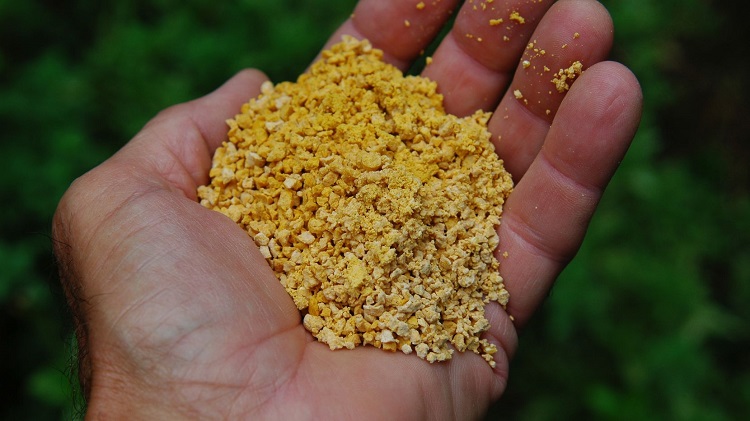
Corn gluten meal is another natural herbicide that’s effective against seeds. It is a by-product of maize starch and wet-milling corn and mostly consists of crude protein.
It works by preventing the formation of germinating plants. In other words, it won’t work for mature weed. It is only effective before the weeds form a root.
Research shows that corn gluten meal is 72.1% effective for keeping weeds off your lawn.
While it doesn’t have a 100% success rate, even synthetic pre-emergence herbicides don’t have that level of result.
Plus, corn gluten meal is safe for both humans and pets. There are two downsides to keep in mind if you opt for this natural herbicide.
First, watering corn gluten meal will render it useless, at least, as a weed killer.
Secondly, applying it to your lawn when weeds have already taken root will produce the opposite effect.
Instead of controlling the weeds, corn gluten meal will act as a good fertilizer to help the weed grow!
With this natural pesticide, timing is crucial. Your best bet would be to apply corn gluten meal on your lawn in early spring.
#3 Diatomaceous Earth
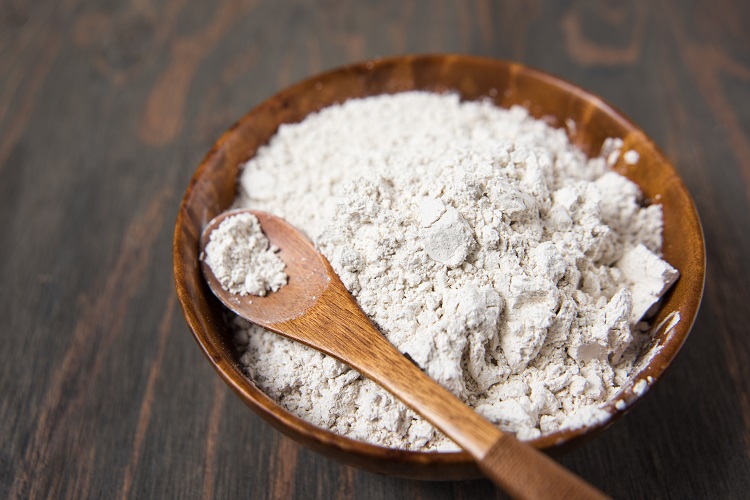
Diatomaceous earth is essentially fine particles of fossilized organisms.
It is an environmentally friendly way to get rid of pests without worrying about any side effects on humans and household pets.
Studies show that this naturally occurring pesticide can eliminate different insect pests that could be problematic for lawns.
Some of these include:
- Grasshoppers
- Crickets
- Beetles
- Ants
- Mites
- Fleas
- Ticks
- Bed bugs
- Cockroaches
- Silverfish
It works by removing the outer coating of insects. Insect pests cannot retain water without their waxy coating.
They will die of dehydration when they come in contact with diatomaceous earth.
Thankfully, the compound doesn’t harm soft-bodied insects such as butterflies and bees. That means you don’t have to worry about disrupting beneficial pollinators.
But just before you head out and pick the next available diatomaceous earth, be aware that there are two types: food-grade and filter-grade types.
You want to go for the food-grade type.
It is approved for use as an insecticide by the FDA, USDA, and EPA. The filter-grade option is toxic to mammals, although it is used in many industries.
#4 Eucalyptus Oil
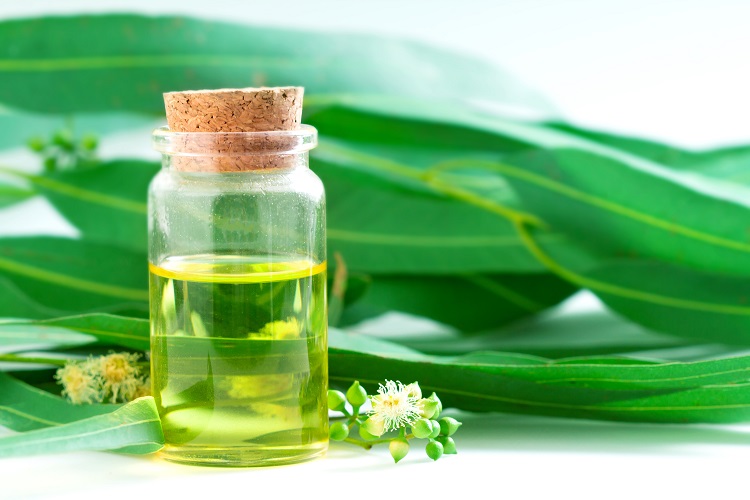
Eucalyptus oil is another effective natural pesticide. A study reveals its ability to control insects, nematodes, bacteria, mites, and weeds.
The essential oil has a strong, sharp smell that repels gnats, ants, and other insects.
Pests don’t like the unfamiliar aroma! They consider it as a potential hazard and would rather avoid it.
Mix the oil with water according to the manufacturer’s directions and spray on your lawn to repel insects.
In addition to repelling pests, eucalyptus oil can also kill scale insects such as mites, aphids, earwigs, and whiteflies.
Remember that the sharp smell won’t stick around for too long. That means you will need to apply eucalyptus oil on your lawn regularly.
#5 Chrysanthemum Flower Tea
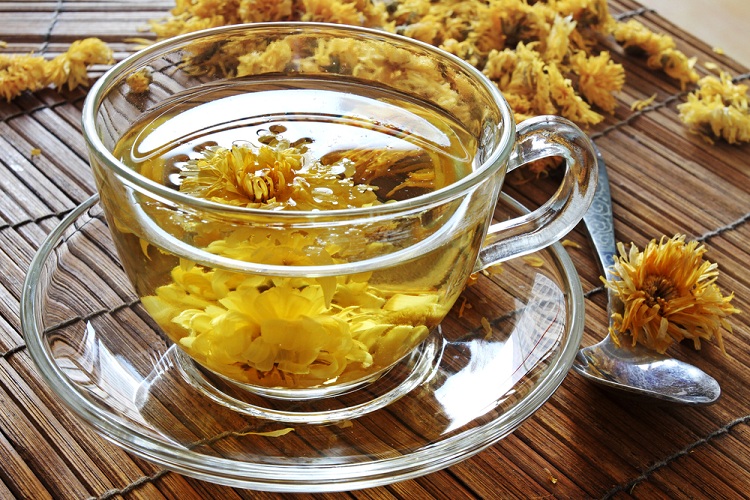
Lastly, you might want to consider using chrysanthemum flower tea if you want to take your organic lawn pest control a step further.
Who would have thought that chrysanthemums (or mums) could be more than a medicinal beverage, right?
Beyond their many health benefits, flowers from this plant contain a powerful compound called pyrethrum.
Research shows that pyrethrum is highly toxic to a host of insect species.
Insects stay away from the compound because it has a neurotoxic effect on them. The pyrethrum blocks several nerve channels in the pests, causing severe damages to the nervous system.
The result? It kills insects!
Thankfully, its toxicity to humans and warm-blooded animals is very low. That’s mostly because of its fast biotransformation. Here’s a simpler way to put it.
The compound degrades quite easily when exposed to light, temperature, and oxygen. It’s pretty easy to apply chrysanthemum flower tea to your lawn.
Instead of going through the hassles of making homemade pesticides, simply buy commercial pyrethrum-based insecticides made from mums and spray them on your lawn.
Final Thoughts
Not all natural pesticides offer effective organic lawn pest control.
Some options such as insecticidal soaps and garlic sprays might work well initially. But it won’t be long before the pests develop resistance against them.
Your best bet would be to opt for one or more vetted and evidence-based natural pesticides. These will make your lawn pest-free and are more reliable when it comes to long-term results.
Resources:
